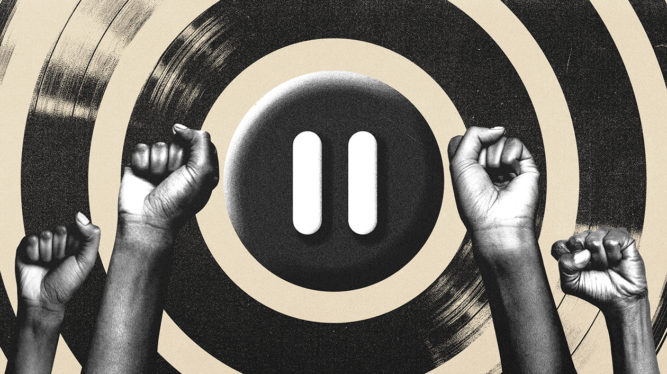Since joining Billboard in 1999, I’ve had the privilege to witness countless R&B and hip-hop artists pour their hearts out onstage and to share their hard-won journeys offstage. During that time, I’ve also had the privilege to tell the stories of songwriters, producers, executives, managers and staffers across the music industry who all play vital roles in the success and evolution of these genres — but never more urgently than in the last three years.
On June 2, 2020, #TheShowMustBePaused brought the music business to a standstill for a day of racial reckoning. It was high time to reverse decades of systemic bias practiced by an industry that had become disproportionately wealthy through the efforts of Black people, their music and culture.
Initially, the industry listened, but the Black Music Action Coalition’s latest report card indicates that the promises made have been largely performative.
Over the last three years, Black executives have won some major C-suite appointments. These include Tunji Balogun joining Def Jam Recordings as chairman/CEO; Rayna Bass rising to co-president of 300 Entertainment; Lanre Gaba’s promotion to co-president of Black music at Atlantic Records; Ryan Press ascending to president of North America at Warner Chappell; Carolyn Williams’ appointment to executive vp at RCA Records; and, most recently, Ezekiel Lewis moving into the role of president of Epic Records.
But sadly, there have also been too many examples of exasperating tone-deafness. Among them are Motown Records’ reintegration under sister label Capitol Records and accompanying staff layoffs during Black History Month following the departure of chairwoman/CEO Ethiopia Habtemariam. There was also the debacle involving Capitol’s racist Black virtual “robot rapper” artist, FN Meka. Both Habtemariam’s exit and FN Meka were cited in the BMAC’s report card, along with the organization’s concern that the industry could revert to its pre-#Show status quo.
Black music executives and creatives I’ve spoken to over the last 18 months say the backsliding is already happening.
As one major-label Black senior executive told me, “I don’t need another initiative that’s conceived, developed, executed and resourced by Black executives. There needs to be a through line of white executives doing this. We need to see them put value to the things [we do] that have derived value for them. Until we see that on a consistent basis across the board, we’re not really going to see change.”
We can’t let DEI become just another flavor of the month. It’s time for the industry leaders who declared they were allies in 2020 to renew their pledges to the Black music community to make meaningful — and rightfully deserved — systemic change happen. No one ever loses sight of the almighty bottom line in this or any business. But please keep this in mind: Change will lead to even greater success.
https://www.billboard.com/pro/music-diversity-equity-inclusion-problem-allies-step-up/






